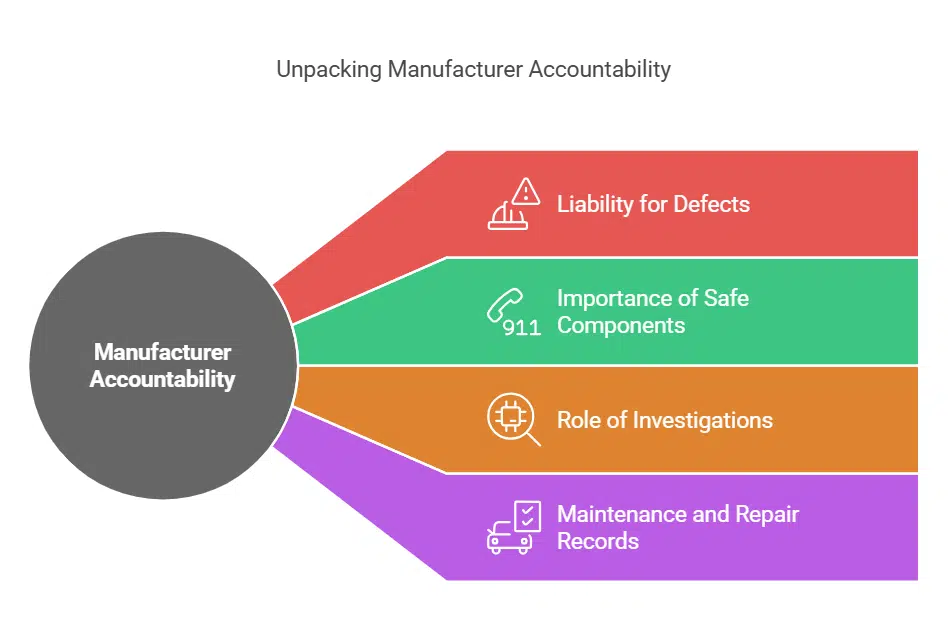When you face a ‘truck accident,’ understanding liability can be confusing. You’ll need to know who bears responsibility. Here’s what you need to consider. The truck driver might be at fault if their actions led to the crash. Employers often share liability if they pressured drivers to meet unreasonable deadlines. Sometimes, truck owners neglect regular maintenance, causing mechanical failures. This can shift blame to them too. Consider the manufacturers of truck parts. Faulty components can make them accountable. You must also think about the cargo loaders. Improper loading can cause trucks to tip or spill. Finally, look at government entities. Poorly maintained roads or unclear signage can contribute to incidents. Each plays a role. Assess all the facts to determine liability. Remember, each case differs. Seek clarity and justice in navigating your options. Your peace of mind depends on understanding these potential liabilities accurately.
Truck Driver Responsibility
Truck drivers have a heavy responsibility on the road. Their actions can lead to accidents. Fatigue, distraction, or impairment often contribute to crashes. Speeding or ignoring traffic rules can also play a part. Drivers must maintain control and stay alert. When they fail, they can be held accountable.
Employer Liability
Employers must ensure drivers operate safely. Pressuring drivers with tight schedules can lead to accidents. Employers might be liable if they encourage or overlook unsafe practices. This includes proper training and adherence to hours-of-service regulations. The Federal Motor Carrier Safety Administration offers guidelines for safe operations.
Truck Owner and Maintenance Obligations
Truck owners have a duty to keep vehicles in safe working order. Neglecting regular maintenance can result in catastrophic failures, shifting blame onto owners. Brake failures or tire blowouts often result from neglected upkeep. Consistent maintenance checks prevent these issues.
Manufacturer Accountability
Faulty parts can lead to accidents. Manufacturers must provide safe and reliable components. If a defect causes an incident, they could be liable. This includes brakes, tires, or other mechanical parts. Detailed investigations often expose these faults. Keep records of all maintenance and repairs.
Cargo Loaders and Improper Loading
Cargo loaders must secure loads properly. Incorrectly loaded cargo can cause tipping or spills, leading to accidents. Securement rules exist to prevent these incidents. When loaders fail to follow these, they can be held accountable. Consistent checks ensure loads remain stable.
Government Entity Responsibilities
Government entities maintain roads and signage. Poor road conditions or inadequate signage contribute to crashes. These conditions include potholes, unclear lanes, or missing signs. If these factors cause an accident, government bodies may share responsibility. Reporting such hazards can spur quicker repairs.
Understanding Liability with a Comparison Table
| Responsible Party | Common Causes of Liability |
| Truck Driver | Fatigue, distraction, speeding |
| Employer | Unreasonable deadlines, lack of training |
| Truck Owner | Neglecting maintenance |
| Manufacturer | Defective parts |
| Cargo Loader | Improperly secured loads |
| Government Entity | Poor road conditions, inadequate signage |
Seeking Legal Assistance
Understanding liability requires careful evaluation of each party’s role. It’s wise to consult legal professionals who specialize in truck accidents. They can help you navigate this complex process. Legal experts offer valuable insights and ensure you pursue rightful claims. Visit the National Highway Traffic Safety Administration for additional resources.
Conclusion
Facing a truck accident involves determining who is accountable. Each party plays a potential role, from drivers to government entities. Exploring all possibilities helps secure justice. Always gather evidence, maintain records, and consult with professionals. Understanding these elements ensures peace of mind as you address the situation confidently. Your well-being and justice matter.




































